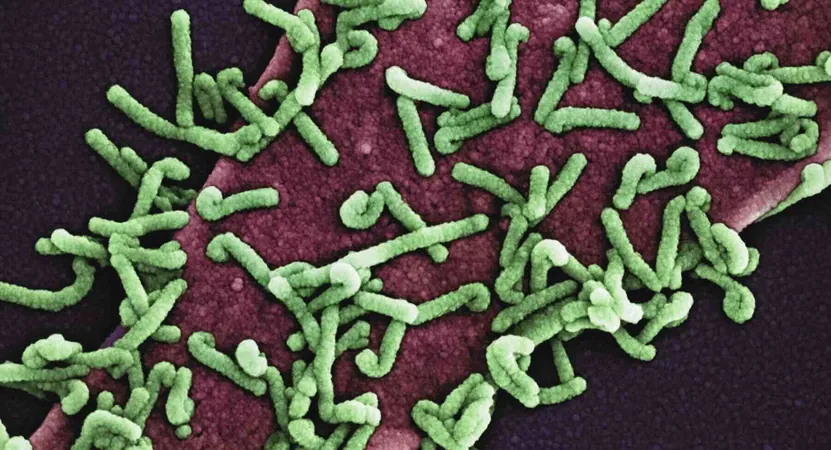
Scientists Sound Alarm: 'Mirror Life' Could Spark Biological Havoc!
2025-09-01
Author: Li
The Rising Threat of Mirror Life
In a groundbreaking revelation, scientists are raising serious concerns about the creation of 'mirror life'—a concept in synthetic biology that could unleash untold chaos if these organisms ever escape the confines of the laboratory. A recent report ominously warns that mirror cells, which are constructed using reversed molecular building blocks, pose a risk of "unprecedented and irreversible harm" to humanity and the environment.
What Exactly is Mirror Life?
At the heart of living organisms on Earth lies a curious trait known as chirality, or 'handedness.' Just like right and left gloves fit uniquely, DNA and proteins have specific orientations. A mirror cell would flip this orientation, creating biological structures that resemble our own—but in reverse.
Theoretically, these mirror cells would grow, reproduce, and function nearly identically to normal cells. However, due to their fundamentally alien molecular makeup, scientists warn of catastrophic consequences should they be synthesized and unleashed on the world.
The Hazardous Potential of Mirror Bacteria
Initially, the pursuit of mirror life appeared promising for medical advancements. Imagine therapies that evade our immune systems! But therein lies the peril. A mirror bacterium, invisible to our defenses, could infiltrate the human body undetected, spreading quietly while our systems remain oblivious.
Furthermore, if these mirror organisms were to escape into nature, they could overwhelm local ecosystems, outcompeting native microorganisms and paving the way for a surge of invasive species. This is not just theoretical—like a biological invader, mirror life could wreak havoc across various species, including plants and animals.
How Soon Could This Become Reality?
As alarming as this sounds, we're not quite there yet. Current technology hasn't yet yielded a fully functioning mirror cell, but progress is being made. Laboratories are experimenting with mirror-image proteins and enzymes—early milestones on the path to creating entire mirror organisms.
Experts predict that within the next decade, we could see the first engineered mirror bacterium. The prospect sends chills down the spines of biosecurity specialists, as even a single accidental release could unleash chaos on an unimaginable scale.
A Call for Urgent Action!
In light of these threats, a coalition of nearly a hundred scientists, ethicists, and policymakers convened in Paris to discuss the pressing need for global action and oversight on this emerging field. With upcoming meetings planned in Manchester and Singapore, the consensus is clear: self-regulation will not suffice.
Failure to act could lead to dire ecological consequences, including the extinction of vulnerable species and irreversible disruptions to our natural world. The report warns that once these synthetic agents enter the environment, combating their spread would be tremendously challenging.
The Bottom Line
Simply put, the world cannot afford to overlook the risks posed by mirror life. As scientists continue to push boundaries in synthetic biology, now is the time for decisive action to avert the potential disaster of mirror organisms escaping their laboratory confines. The future of biodiversity hangs in the balance!





 Brasil (PT)
Brasil (PT)
 Canada (EN)
Canada (EN)
 Chile (ES)
Chile (ES)
 Česko (CS)
Česko (CS)
 대한민국 (KO)
대한민국 (KO)
 España (ES)
España (ES)
 France (FR)
France (FR)
 Hong Kong (EN)
Hong Kong (EN)
 Italia (IT)
Italia (IT)
 日本 (JA)
日本 (JA)
 Magyarország (HU)
Magyarország (HU)
 Norge (NO)
Norge (NO)
 Polska (PL)
Polska (PL)
 Schweiz (DE)
Schweiz (DE)
 Singapore (EN)
Singapore (EN)
 Sverige (SV)
Sverige (SV)
 Suomi (FI)
Suomi (FI)
 Türkiye (TR)
Türkiye (TR)
 الإمارات العربية المتحدة (AR)
الإمارات العربية المتحدة (AR)